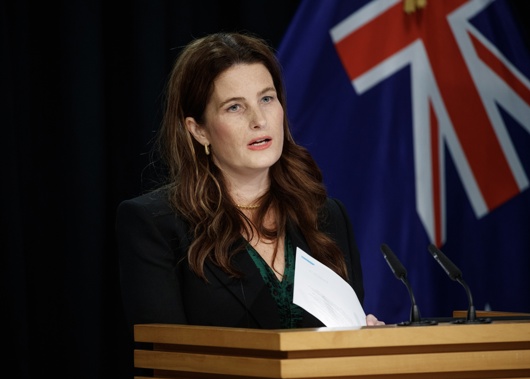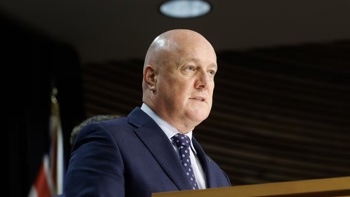
In the end, it all comes down to taxes. This Government has promised to cut New Zealanders’ income tax, and that is precisely what the Minister of Finance, Nicola Willis, is determined to announce on May 30 when she delivers her first Budget.
Clearly, she and her Cabinet colleagues are of the view that any failure to deliver on their tax promise would be politically catastrophic. Without the tax cuts, her first Budget, like Arnold Nordmeyer’s, the infamous “Black Budget” of 1958, would guarantee that Christopher Luxon’s coalition Government is a one-term wonder.
The comparison with Nordmeyer’s Budget is instructive. The Second Labour Government (1957-1960) had come into office largely on account of an ailing economy and a burgeoning balance-of-payments crisis.
Nordmeyer’s clear duty, as Minister of Finance, was to reduce the domestic consumption of non-essential/harmful goods imported from overseas – cars, alcohol, tobacco – which he duly did. Within two years the crisis which Nordmeyer inherited had largely abated. As an economic document, his first Budget was an impressive success.
But, politically, it was an unmitigated disaster. Before entering Parliament, Nordmeyer had been a Presbyterian minister, a species not known for its easy-going acceptance of those Kiwis who enjoyed a drink and a smoke – or anything else that gave them pleasure.
Raising the price of booze and baccy was, accordingly, portrayed as the work of a “wowser” – i.e. a person determined to prevent others from having fun. Worse still, it branded Nordmeyer as an enemy of the New Zealand working class.
Or, more accurately, it allowed Fintan Patrick Walsh, leader of the Federation of Labour (forerunner of today’s Council of Trade Unions) to brand Nordmeyer as the working man’s enemy. The bad blood between Nordmeyer and Walsh went all the way back to the mid-1930s when Nordmeyer had led a successful caucus revolt against what most Labour MPs considered Michael Joseph Savage’s over-cautious approach to stimulating the economy.

Walsh was notorious for neither forgetting nor forgiving anyone who dared to challenge the union movement over which he’d presided, with thuggish efficiency, for decades.
As BERL’s Hugh Parsons wrote in a Black Budget retrospective article in 2022:
“Walsh pulled no punches referring to ‘Reverend’ Nordmeyer’s Budget as ‘an attack on the worker’s standard of living’. The Black Budget term was quickly picked up by National leader, Keith Holyoake, as ammunition against the Labour Party. Notably, most of the Labour caucus were not consulted during the budgeting process and had to 'glumly' carry the budget into debate. It did not help that neither Nash nor Nordmeyer smoked, drank, or owned a car.”
Nordmeyer, who was arguably one of Labour’s most progressive finance ministers, never managed to shake the devastating political impact of his first Budget. It hung around his neck like the Ancient Mariner’s albatross – stinking-up the Second Labour Government’s otherwise excellent record all the way to the 1960 General Election, when it was unceremoniously ejected from the Treasury Benches – real estate which the Labour Party would not reclaim for another 12 years.
With less than three weeks to go until she rises in the House of Representatives to read her Budget speech, Willis is not about to surprise her own back-benchers by announcing that National’s much-anticipated tax cuts are “off”.
If a single One News-Verian poll could inspire something approaching orgasmic howls of delight from the coalition Government’s journalistic critics, then cancelling the promised tax cuts would likely occasion a veritable orgy of media disparagement.
Forgotten in the rush to condemn the Finance Minister’s broken promise would be the steady drumbeat of negative economic commentary that has echoed in Luxon’s and Willis’ ears ever since the policy was announced in 2023. From Chris Renny at the CTU, to the professional forecasters at the OECD, the verdict has been unanimous: New Zealand cannot afford these tax cuts – they should be abandoned.
Exactly why they should be abandoned is made admirably clear in the OECD Report. Rendered graphically, the impact of ditching the policy is registered in the steadily rising line of state revenue, and in its imminent rendezvous with the plateauing line of state spending. If Willis persists with the tax cuts, those lines show no sign of intersecting any time soon.
The dire consequences of their failure to meet have been spelled out by everyone from Matthew Hooton to Richard Prebble. Seldom has the New Zealand Right been so united in its opposition to the flagship policy of its own political parties. In rare harmony with the voices of the Left, the Right is chorusing: “No tax cuts!”
If it is, unquestionably, too late to heed this blunt advice less than three weeks from Budget day, such was not always the case. Having won the Treasury benches, National, Act and NZ First could very easily have declared that the briefings received from officials, filled with information they did not possess in Opposition, made it very clear that proceeding with the promised tax cuts in 2024 would not only be unwise, but also reckless.
The policy was not being abandoned, they would hasten to add, merely postponed until the country could afford them, which, if the OECD is to be believed, will not be for a very long time.
It is not difficult to anticipate the paens of praise that would have been sung in celebration of the coalition’s decision. Academic, bank and “independent” economists would all have hailed Luxon’s, Willis’ and their coalition partners’ willingness to put the interests of the whole nation ahead of purely partisan considerations. This was proof, the experts would all have averred, of their political maturity.
The Opposition parties could hardly complain, not when the Government was doing exactly what they’d begged it to do, and kept the revenue rolling-in for school lunches, disabled carers, understaffed hospitals and underpaid police officers.
Albeit grudgingly, even the hyperventilating journalists of the press gallery would have been forced to say something positive about the coalition Government and its “courageous” Finance Minister.
With all these obvious benefits glittering before their eyes, why did Luxon and Willis not reach out and grab them with both hands? It is to be hoped that the answer to that question is not bound up with the Right’s visceral fear of being considered weak, or – God forbid! – kind. It is, however, an answer to be considered seriously.
The conservative view of human nature is bleak. The world is full of selfish and unreliable people. Those charged with governing a nation cannot afford to let the lazy and the criminal catch even the slightest whiff of weakness.
The loyalty of those who “work hard to get ahead” can only be secured by allowing them to witness the fate of those who do not. Tax cuts are, inevitably, part of this equation but, much more important than the extra cash, is the message they send about the consequences of choosing unwisely.
Willis’ tax cuts may, or may not, be fiscally “neutral”, but the social damage they are bound to inflict most certainly will not be. Willis is about to make the lash of austerity an inescapable part of this Government’s arsenal, and it will not be opening-up wounds on anything except the backs of the poor.
For those on the wrong side of the social ledger, all budgets are black.
Take your Radio, Podcasts and Music with you









